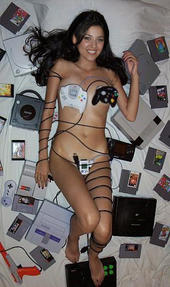The Future of Console Gaming
We're currently up to the 7th generation of gaming consoles (the first being PONG, the third being the NES and Sega Genesis, etc). The 7th generation consists primarily of three consoles - Ninendo's Wii, Sony's PlayStation 3, and Microsoft's Xbox 360. The Xbox 360 is the only console currently available on the market, with the other two expected out late this year. But where are these consoles, their successors, and the console gaming market in general headed? It might help to examine why consoles exist in the first place.

The earliest form of what we today consider "gaming" was, of course, arcades. The 1970s is considered the golden age of the arcade and coin-op video games. Home video games and gaming systems became available in the '70s and '80s - the Magnavox Odyssey, PONG, etc. Everything was going swell until the gaming market crashed in 1983 and a bunch of companies lost their shirts. After this a sort of dark age followed, where there wasn't much of a market at all for home video games.
BUT! That's why God made the Japanese! The Nintendo Entertainment System, released in 1985 and popularized about two years later, completely revitalized the gaming industry. (Those years only apply to the States, by the way - Japan was ahead.) The NES was so awesome that it remains popular to this day, which is impressive for a computer that's so old, its patent has expired.
Speaking of computers - what effect have they had on the console market? Well, home computers began getting quite popular in the early '90s, around the same time the SNES, successor to the NES, was released. The SNES didn't have hardware that impressive; processor was around 4MHz, a couple kB of RAM, and so forth. A computer could run circles around that! 25, 33MHz, multiple megs of RAM! But the important quantity to note is that computers still cost - I'm told - around $3,000. And this was before eMachines, folks - all computers were mega-expensive. Everything about the computers of the early '90s was considerably more painful and intimidating than today, and there was also another major problem: the lack of a suitable, widely supported gaming peripheral.
Now, I'm sure there was some sort of early joystick or even gamepad in the early '90s, but try to:
Now, certainly there were hobbyists writing games for PCs, and companies like The Learning Company making edutainment games for PCs, but consoles appealed to all demographics; they were simple and fun. So PCs didn't really hold much influence over the market, or pose much of a threat. The situation today couldn't be more different.

Everyone and his grandmother (quite literally) owns a computer. They're cheap, even comparable to modern consoles. (A Mac Mini costs less than a PS3.) They're easier to use and set up. They have USB. All of the old reasons that people bought consoles - cost, ease of use, interface - hardly apply anymore. This leads to the rather unsurprising trends of modern consoles:
The inherent strength of the console is its uniformity. If you buy a given console, like a SNES, it'll be the same as all the other SNESes in the country, and will be able to play any licensed SNES game, guaranteed. This certainly cannot be said of the PC, and is one of the reasons that stuff like controllers haven't caught on in the same way; a PC is only guaranteed to have a keyboard and mouse (or trackpad or something). This brings me back to the issue of interface.
I think that Nintendo is going to revolutionize the gaming industry again, just like they did 20 years ago. This time, it will be with the Wii (home consoles) and the Nintendo DS (handhelds). The primary innovation of the Wii is its motion-sensing controller. If it works as well as they say it does (last thing Nintendo needs is to release a lemon), it will revolutionize console gaming. It will add an entire new level to the console interface - swing a sword, aim a gun, steer a car. It's all much more visceral, and well suited to group gaming. Because of console conformity, all Wii games will be designed from the ground up to use this interface; companies don't have to make calculated risks by hoping that people will buy a special peripheral (at added cost) with the game, and games won't have to be ported and retrofitted to work around the differences/limitations of the new controller, as the focus is on original Wii games.
So where are the other consoles headed? Possibly due to a lack of better ideas, Microsoft and Sony are screwing themselves by trying to make their consoles more like home computers. In particular, there's a focus on making a "multimedia center" out of the console - DVD player, music, things like that. In other words, they want to make a console that performs functions that are already performed, better, by things I already own. There's also focus on internet multiplayer gaming (e.g. Xbox Live), which is clearly the purview of PCs. These systems are also much more upgradeable; even upon release, there's a good/expensive/premium/cocaine version, and a bad/cheap/economy/crack version for $100 less or so. This is a disturbing departure from the console conformity which has been the rule for years and years.
The Wii is the only console offering unique features provided by nothing else. While the Wii game library could hypothetically be ported to the PC (with a special motion-sensing USB controller), this isn't likely to happen on a large scale, because of the Wii's inexpensiveness and simplicity. By being the only company to produce something that isn't an isomorph of a PC, Nintendo will reinvent the entire gaming industry, which has been reduced to a spinning miasma of low-quality ports, banal first person shooters, and safe sequels.
Unless they do something stupid.

The earliest form of what we today consider "gaming" was, of course, arcades. The 1970s is considered the golden age of the arcade and coin-op video games. Home video games and gaming systems became available in the '70s and '80s - the Magnavox Odyssey, PONG, etc. Everything was going swell until the gaming market crashed in 1983 and a bunch of companies lost their shirts. After this a sort of dark age followed, where there wasn't much of a market at all for home video games.
BUT! That's why God made the Japanese! The Nintendo Entertainment System, released in 1985 and popularized about two years later, completely revitalized the gaming industry. (Those years only apply to the States, by the way - Japan was ahead.) The NES was so awesome that it remains popular to this day, which is impressive for a computer that's so old, its patent has expired.
Speaking of computers - what effect have they had on the console market? Well, home computers began getting quite popular in the early '90s, around the same time the SNES, successor to the NES, was released. The SNES didn't have hardware that impressive; processor was around 4MHz, a couple kB of RAM, and so forth. A computer could run circles around that! 25, 33MHz, multiple megs of RAM! But the important quantity to note is that computers still cost - I'm told - around $3,000. And this was before eMachines, folks - all computers were mega-expensive. Everything about the computers of the early '90s was considerably more painful and intimidating than today, and there was also another major problem: the lack of a suitable, widely supported gaming peripheral.
Now, I'm sure there was some sort of early joystick or even gamepad in the early '90s, but try to:
- Convince your parents to buy a computer for your 8th birthday
- Convince your parents to buy a newfangled PC joystick for Christmas
- Install the newfangled PC joystick
- Install all kinds of weird drivers
- Do god knows what to config.sys
- Do god knows what with IRQs
- Find some games that will work with the damn thing
- Convince your parents to buy a SNES for your 8th birthday
Now, certainly there were hobbyists writing games for PCs, and companies like The Learning Company making edutainment games for PCs, but consoles appealed to all demographics; they were simple and fun. So PCs didn't really hold much influence over the market, or pose much of a threat. The situation today couldn't be more different.

Everyone and his grandmother (quite literally) owns a computer. They're cheap, even comparable to modern consoles. (A Mac Mini costs less than a PS3.) They're easier to use and set up. They have USB. All of the old reasons that people bought consoles - cost, ease of use, interface - hardly apply anymore. This leads to the rather unsurprising trends of modern consoles:
- Great expense (the full Xbox 360 is $400 and Microsoft still loses tons of money on each one sold)
- Architectural similarity to PCs (NVidia graphics cards, etc)
- Massive porting
The inherent strength of the console is its uniformity. If you buy a given console, like a SNES, it'll be the same as all the other SNESes in the country, and will be able to play any licensed SNES game, guaranteed. This certainly cannot be said of the PC, and is one of the reasons that stuff like controllers haven't caught on in the same way; a PC is only guaranteed to have a keyboard and mouse (or trackpad or something). This brings me back to the issue of interface.
I think that Nintendo is going to revolutionize the gaming industry again, just like they did 20 years ago. This time, it will be with the Wii (home consoles) and the Nintendo DS (handhelds). The primary innovation of the Wii is its motion-sensing controller. If it works as well as they say it does (last thing Nintendo needs is to release a lemon), it will revolutionize console gaming. It will add an entire new level to the console interface - swing a sword, aim a gun, steer a car. It's all much more visceral, and well suited to group gaming. Because of console conformity, all Wii games will be designed from the ground up to use this interface; companies don't have to make calculated risks by hoping that people will buy a special peripheral (at added cost) with the game, and games won't have to be ported and retrofitted to work around the differences/limitations of the new controller, as the focus is on original Wii games.
So where are the other consoles headed? Possibly due to a lack of better ideas, Microsoft and Sony are screwing themselves by trying to make their consoles more like home computers. In particular, there's a focus on making a "multimedia center" out of the console - DVD player, music, things like that. In other words, they want to make a console that performs functions that are already performed, better, by things I already own. There's also focus on internet multiplayer gaming (e.g. Xbox Live), which is clearly the purview of PCs. These systems are also much more upgradeable; even upon release, there's a good/expensive/premium/cocaine version, and a bad/cheap/economy/crack version for $100 less or so. This is a disturbing departure from the console conformity which has been the rule for years and years.
The Wii is the only console offering unique features provided by nothing else. While the Wii game library could hypothetically be ported to the PC (with a special motion-sensing USB controller), this isn't likely to happen on a large scale, because of the Wii's inexpensiveness and simplicity. By being the only company to produce something that isn't an isomorph of a PC, Nintendo will reinvent the entire gaming industry, which has been reduced to a spinning miasma of low-quality ports, banal first person shooters, and safe sequels.
Unless they do something stupid.


0 Comments:
Post a Comment
<< Home